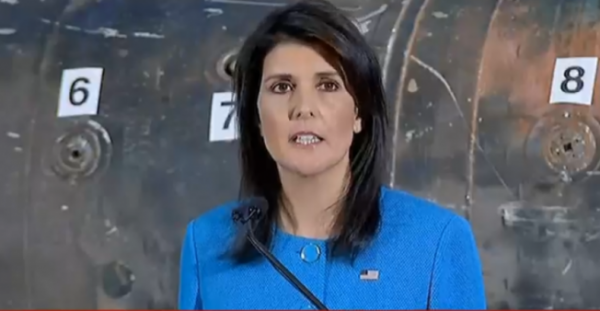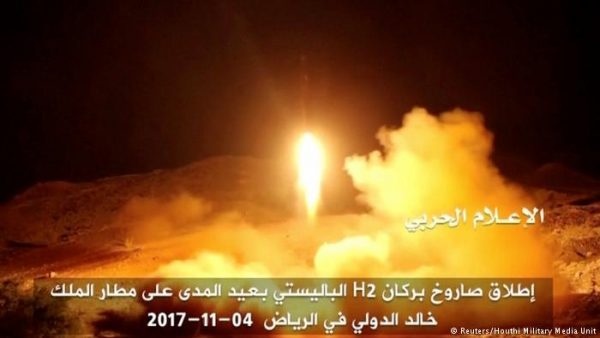
The United States on Thursday presented pieces of what it said is the missile fired at Saudi Arabia by Houthi militia in Yemen, describing it as conclusive evidence of Iran involvement and its violation of UN resolutions.
Reuters was given advanced access to the military hangar at Joint Base Anacostia-Bolling just outside of Washington where the U.S. Defense Department put the fragments of weaponry on display and explained how it concluded that they came from Iran.

Iran has denied supplying the Houthis with such weaponry.
“The U.S. has long believed that Iran is providing weaponry to proxies and partners and militias throughout the region, and what we have here to show you today is proof,” said Pentagon spokeswoman Laura Seal, adding Saudi Arabia and the United Arab Emirates had recovered the arms and loaned them to Washington.
Saudi-led forces, which back the Yemeni government, have been fighting the Iran-allied Houthis in Yemen’s more than two-year-long civil war.
The unprecedented presentation by the Pentagon is part of its follow-through on President Donald Trump’s new Iran policy, which promises a far harder line toward Tehran.
U.S. Ambassador to the United Nations, Nikki Haley, was due to see the weapons on Thursday. The U.S. mission to the United Nations said she would offer “irrefutable evidence that Iran has deliberately violated its international obligations.”
Under a U.N. resolution that enshrines the Iran nuclear deal with world powers, Tehran is prohibited from supplying, selling or transferring weapons outside the country unless approved in advance by the U.N. Security Council. A separate U.N. resolution on Yemen bans the supply of weapons to Houthi leader Abdul-Malik al-Houthi and others.
Katie Wheelbarger, principal deputy assistant secretary of defense for international security affairs, acknowledged that there could be implications of such an accumulation of evidence against Iran, to include sanctions.
“You could see future sanctions… But the first step is at least to bring awareness and understanding and to have a similar picture of what we’re looking at,” Wheelbarger said.
Iran links
The Pentagon offered a detailed explanation of all of the reasons why it believed the arms came from Iran, noting Iranian corporate logos on arms fragments and the unique nature of the designs of Iranian weaponry.
That included the designs of short-range “Qiam” ballistic missiles. The Pentagon said it had obtained fragments of two Qiam missiles, one fired on Nov. 4 against the airport and another fired on July 22.
The Pentagon cited corporate logos of Iranian defense firms on jet vanes that help steer the missile’s engine and on the circuit board helping drive its guidance system. It also said the missile’s unique valve-design was only found in Iran.
Iran, it said, appeared to have tried to cover-up the shipment by disassembling the missile for transport, given crude welding used to stitch it back together.
“The point of this entire display is that only Iran makes this missile. They have not given it to anybody else,” Seal said. “We haven’t seen this in the hands of anyone else except Iran and the Houthis.”
A new U.N. report found that the July 22 and Nov. 4 missiles fired at Saudi Arabia by Yemen’s Houthi rebels appeared to have a “common origin.” But the report said U.N. officials were still investigating U.S. and Saudi claims that Iran supplied them.
The Pentagon put on display other weapons with designs it said were unique to Iran’s defense industry. It pointed to a key component of a Toophan anti-tank guided missile and a small drone aircraft, both of which were recovered in Yemen.
It also showed components of a drone-like navigation system like the one the Pentagon says was used by the Houthis to ram an exploding boat into a Saudi frigate on Jan. 30. The United Arab Emirates seized the system in late 2016 in the Red Sea.
“What makes these exploding boats so dangerous is not just that they can explode. It’s that they have a guidance system that allows them to track and hit a moving target without an operator on board,” Seal said.
“This computer system here represents that navigational system.”
(REUTERS)
Leave a Reply
You must be logged in to post a comment.